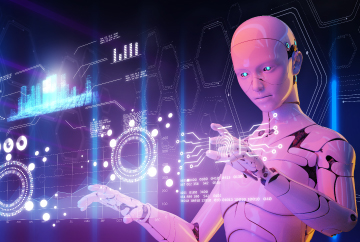AI and MedTech are designing a glowing healthcare tomorrow together. AI is an instrument and disruptor of medicine as it raises efficiency, accuracy, and availability. It does so by accelerating diagnoses, improving clinical procedures, and turning informed speculation into actionable foresight towards better patient outcomes.
Using AI as powerful ally in accurate diagnosis and personalised care
Artificial Intelligence is transforming MedTech by enabling faster, more precise diagnoses and unlocking insights that further empower human doctors. Modern healthcare generates vast and complex data—from genetic profiles and medical imaging (CT scans, MRIs) to electronic health records and real-time patient monitoring. AI-powered systems can process this information at scale, examine patterns, and identify anomalies with remarkable accuracy, helping clinicians diagnose diseases earlier and more confidently.
For example, deep learning algorithms applied to radiology can identify tiny anomalies in X-rays, MRIs, and CT scans long before patients have any signs of illness. Studies even show that AI models, such as Google’s breast cancer detection system, outperform human radiologists in accuracy. Pathology uses AI techniques to locate malignant cells in tissue sample images. As a result, it accelerates the process of making intelligible and accurate decisions by doctors regarding the next step in the treatment.
By handling data-intensive tasks, AI frees doctors to focus on what matters most—patient care. It empowers clinicians to make informed decisions and devise personalised treatment plans tailored to individual needs. Thus, AI acts as a powerful ally to doctors enhancing their expertise & making healthcare smarter, faster, and more patient-centric.
Predictive Analytics: Going from Reactive to Proactive Care
- AI is changing healthcare from fixing problems after they happen to prevent them from happening in the first place. Predictive analytics models utilize patient information to forecast potential future health issues, enabling doctors to address them more effectively.
- More hospitals are using AI systems to monitor vital signs and past data to detect problems like sepsis, cardiac arrest, or stroke hours before they happen. This early warning system enables medical teams to act quickly, potentially saving lives and reducing the cost of long-term care.
- Wearable technology that works with AI is another exciting area. Biosensors and smartwatches are now capable of continuously monitoring blood sugar, heart rate, and oxygen levels. AI algorithms let people and doctors know at real time when something goes wrong. This fills the gap between getting care at home and in a hospital.
Using resources wisely and making healthcare work better
- AI is transforming far more than just how hospitals and clinics diagnose and treat patients. Today, we use machine learning algorithms to help predict how many patients will show up, ensure the best use of staff, and manage medical supplies efficiently. These measures are all essential for lowering costs and improving service quality.
- Thanks to NLP, people are already working in new ways. Artificial-intelligence based transcription and data entry tools are helping doctors stay on top of their paperwork, enabling them to spend more time with patients. Virtual assistants and chatbots are increasingly being deployed that can make appointments, perform rudimentary triage, and answer patient questions. This way, patients stay engaged, and operations run smoothly.
- Big health care systems also use AI to discover inefficiencies in their processes and develop measures to correct them. This helps hospitals reduce waiting times, provide better service, and improve patient satisfaction.
Precision medicine helps in tailoring care for each individual
- Precision medicine utilizes AI to tailor treatments to individuals based on their genetic makeup, lifestyle choices, and environmental factors. Machine learning algorithms can analyze genomic data to find gene changes linked to specific diseases. This helps doctors devise different treatment plans for each patient thus improving outcomes.
- AI is also speeding up the process of finding new drugs for drug companies. It accelerates the process of getting new treatments to market and lowers the cost by simulating how molecules interact and making educated guesses about how well drugs will work. In Oncology, for example, AI algorithms are helping doctors figure out which cancer treatments will work best for each kind of cancer, which significantly affects individuals' health and survival rate.
Problems and moral questions
AI has much potential in MedTech but also has some big challenges. People are still apprehensive about privacy, algorithm bias, and following the rules. Healthcare data is highly sensitive, so AI systems must be careful and trustworthy.
But AI models can only be as fair as the data they use to learn. If the datasets lack complete information or fail to represent the entire population, it may be more challenging to identify the issue, particularly for under-represented groups. The US FDA and EMA are two organizations that control the production and use of medical devices and drugs. Recently, they have turned their attention to AI tech and want to ensure it is entirely safe, proper, and fair before it can be adopted in the hospital setting.



